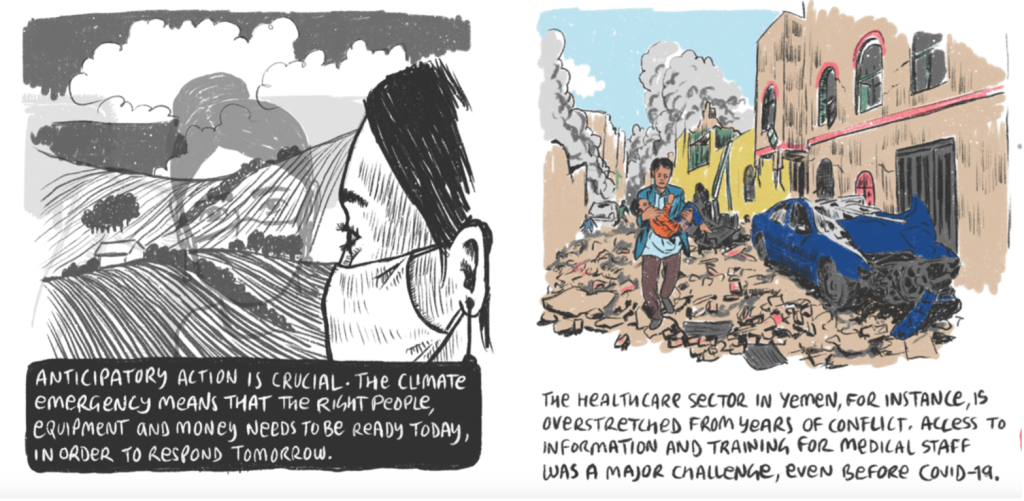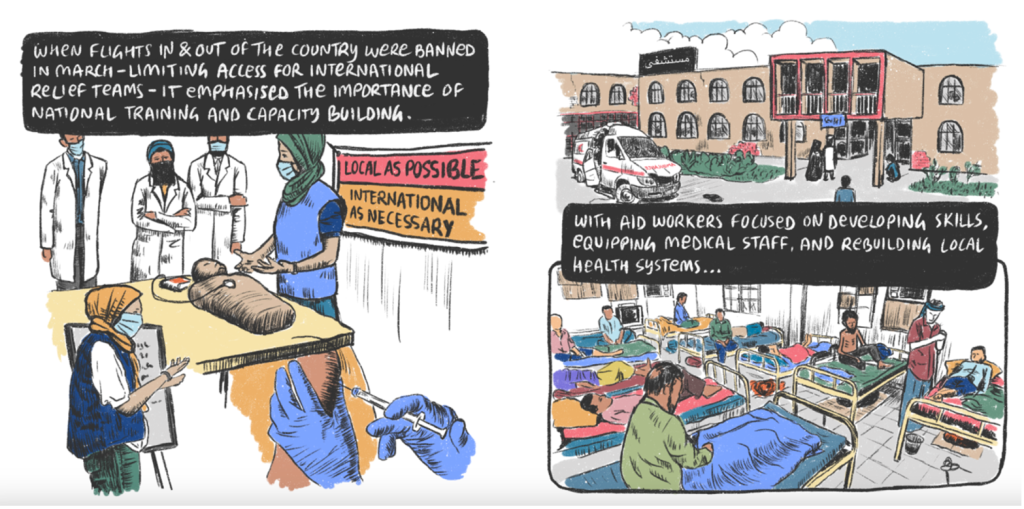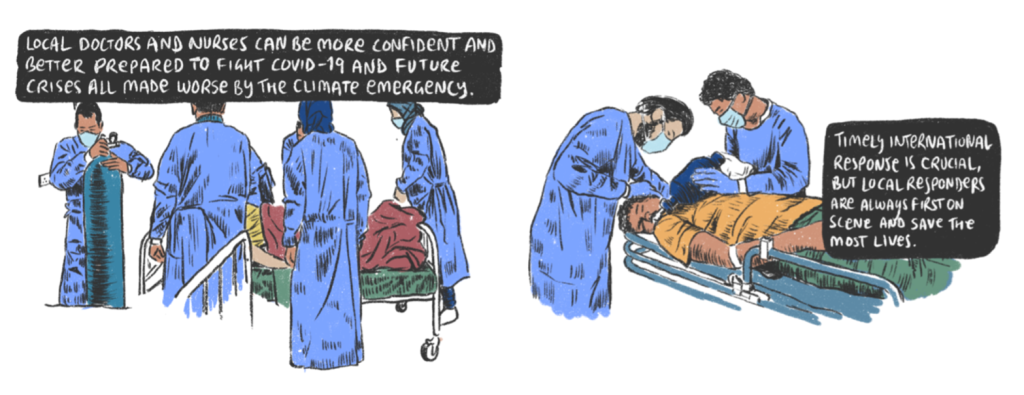Extension Activities Units 15 & 16
Units 15 & 16 – Climate
- SDG 15 – Life on Land
- SDG 13 – Climate Action
After every two Units you are offered a choice of extension tasks. Depending on what area you most want to develop, choose and complete a relevant task. You are welcome to complete as many as you like.
These are not tests, and no marks are awarded. They are opportunities to develop your language further, based on a self-assessment of your needs.
NOTE: It may be that in your local context you are not able to access the videos on YouTube. They’re included here alongside other free-to-access resources, so hopefully you will still have plenty of choice.
Develop your knowledge of the SDGs
1. Test your knowledge of SDG15 & SDG13 with Go Goals digital board game
Go Goals is a ready-to-use board game developed by the United Nations that helps you understand the Sustainable Development Goals, and how each of us can contribute to realising the goals. Access this link to the game and click on the white circle next to goal 15 and goal 13 and answer the set of quiz questions that appear. Check your answers when you are done.
2. Find out more about SDG13 Climate Action
Use this climate action worksheet from the New York Times. In this lesson you’ll learn about some of the most effective strategies and technologies that can help head off the worst effects of global warming.
3. Input any text into the OSDG Wheel and you will be able to see any key SDGs in the text along with their estimated relevance scores (%), followed by any additional SDGs found in the text. Try inputting one of the texts you’ve been reading in these 2 Units.
Develop your writing
In Units 15 and 16 you learned about the way the climate crisis is affecting life on earth. What happens when people are under-prepared for natural disasters caused by the climate crisis? Read the graphic story and find out about life in Yemen when the Covid-19 pandemic hit.
Write a paragraph about the importance of funding the planning process so that countries are better equipped to respond to crises in their context.



2. Publish your writing
Letters to the Earth is a website where people from all over the world of all ages are submitting and sharing their letters. You can find resources to help you write a letter on the website as well as details about how to submit.
Develop your speaking
Design and deliver a Pecha Kucha (Japanese for chit-chat). This presentation format is based on using 20 presentation slides but only talking about each of them for 20 seconds (each presentation should be 6 minutes and 40 seconds long).
- Only still images on the slides – no text or videos
- Each slide only stays on the screen for 20 seconds only
- What you say should be about the slide that is showing
Choose one of the topics and find 20 relevant images:
- What you’ve learned in these two Units: Create a presentation with images of different topics or themes you have studied.
- One of the Goals: Create a presentation with images based on one of the SDGs.
- A story: Create a sequence of images of people places and things related to one or both of the SDGs.
- An initiative you would like to be involved with: Research an initiative happening somewhere in the world. Create a sequence of 20 images.
Configure your slide timings so that the slides automatically change after 20 seconds. This will oblige you to be very concise!
You can practice recording your presentation/timing here:
Develop your pronunciation – Contrastive stress
In Unit 16 you learned about contrastive stress and how moving the main stress in a sentence can change the meaning. Watch this video from the British Council LearnEnglish to consolidate your learning.
Develop your reading – Read for interest
Access the link and read one (or more) of the following texts. Practice your skim reading first to get a general idea of what the text is about, and then read in more detail, focusing on the parts that interest you.
Articles from The Conversation:
- The most influential climate science paper of all time
- Coffee may become more scarce and expensive thanks to climate change – new research
- Seven ways to save lives on the frontline of the climate crisis
- 3 reasons local climate activism is more powerful than people realise
- 3 dangers of rising temperatures that could affect your health now
Pathways to Sustainability
How could camel milk change the fortunes of Gujarat’s pastoralists?
Develop your vocabulary
VoiceTube – Climate change: The view from MinuteEarth
Read more about each term used in the crossword in Unit 16.
Develop your listening
Access one (or more) of the links and listen to the text. Listen once for general idea and then listen again for detail, focusing on the parts that interest you.
Resources from The Conversation podcasts
- The path to net zero
- Have climate change predictions matched reality?
- Exploring the use of the Moringa plant in South Africa
- How South Africa can deliver on the right to food
University of Sussex Open Lecture series – ‘A fossil treaty’, by Prof Peter Newell (9 mins)
TedEd video lessons:
- A warm embrace that saves lives, by Jane Chen
- The disarming case to act right now on climate change – Greta Thunberg (links to Unit 13 Writing)
- Climate change: Earth’s giant game of Tetris, by Joss Fong
- The science behind a climate headline, by Rachel Pike
- How long will human impacts last?, by David Biello
5 Interactive climate change education tools
Interactive climate change education tools
Take action
Access the links to Goal 15 and/or Goal 13 and select an action you can take in your everyday life to help meet the aims of these SDGs.
Or, choose an action from The Good Life Goals.
Sing
1. ‘Wonderful world’, by Louis Armstrong (1967)
When he issued a remake of this song in 1970, Armstrong included a spoken introduction where he addresses complaints about the world being far from ‘wonderful’ by saying “Seems to me, it ain’t the world that’s so bad but what we’re doin’ to it. And all I’m saying is, see, what a wonderful world it would be if only we’d give it a chance”.
Go to the lyricstraining website to listen the song and practice your listening skills by filling in some of the words as you listen. You may need to click the ‘go to web’ button at the top of the screen to get started. You don’t need to create an account – just click ‘maybe later’ when you see the prompt on the screen. Try the ‘intermediate’ level (where you have to fill in 25% of the words as you listen) and if you can do that quite easily switch to the ‘advanced’ level (50%). Use the arrow keys below the video to listen again or to skip and have the word revealed if you can’t catch it.
2. ‘Big Yellow Taxi’, by Joni Mitchell (1970)
‘They’ve paved paradise to put up a parking lot’.
The lyrics were inspired by a trip to Hawaii, where Mitchell describes being heart-broken at the sight of car parks (BrE)/parking lots (AmE) as far as the eye could see. Despite its age, the song is still relevant today. ‘DDT’ is a reference to Dichlorodiphenyltrichloroethane, a pesticide that has detrimental impacts on wildlife, water and human health and was heavily used at the time.
Go to the lyricstraining website to listen to a cover version of the song by Counting Crows and practice your listening skills by filling in some of the words as you listen. You may need to click the ‘go to web’ button at the top of the screen to get started. You don’t need to create an account – just click ‘maybe later’ when you see the prompt on the screen. Try the ‘intermediate’ level (where you have to fill in 25% of the words as you listen) and if you can do that quite easily switch to the ‘advanced’ level (50%). Use the arrow keys below the video to listen again or to skip and have the word revealed if you can’t catch it.
Or listen to the original Joni Mitchell version here.
3. Fall on me, by R.E.M. (1986)
This song was initially about environmentalism and the problem of acid rain. The result of pollutants, acid rain damages forests, fresh water, aquatic life and infrastructure. It causes paint to peel, steel on bridges to corrode, and stone statues to erode. Hence the first line ‘Don’t fall on me’. Go to the Lyrics Training website to listen to the song and practice your listening skills by filling in some of the words as you listen. You may need to click the ‘go to web’ button at the top of the screen to get started. You don’t need to create an account – just click ‘maybe later’ when you see the prompt on the screen. Try the ‘intermediate’ level (where you have to fill in 25% of the words as you listen) and if you can do that quite easily switch to the ‘advanced’ level (50%). Use the arrow keys below the video to listen again or to skip and have the word revealed if you can’t catch it.
4. Eyes Wide Open, by Gotye
This is a song by the Belgian-Australian musician Goyte. It is set in the future when people are living on a planet destroyed by our current irresponsibility and indifference. Goyte says the real tragedy is that we know what we’re doing to the world but don’t have the will to change – ‘We walk the plank with our eyes wide open’ (walk the plank = to be forced by pirates to walk to one’s death off the end of a plank jutting out over the water from the side of a ship).
Go to the Lyrics training website to listen to the song and practice your listening skills by filling in some of the words as you listen. You may need to click the ‘go to web’ button at the top of the screen to get started. You don’t need to create an account – just click ‘maybe later’ when you see the prompt on the screen. Try the ‘intermediate’ level (where you have to fill in 25% of the words as you listen) and if you can do that quite easily switch to the ‘advanced’ level (50%). Use the arrow keys below the video to listen again or to skip and have the word revealed if you can’t catch it.
Something else?
Is there something you spent time studying this week that hasn’t been covered above? What is it? Explain in detail either in writing or as an audio file on your phone.

